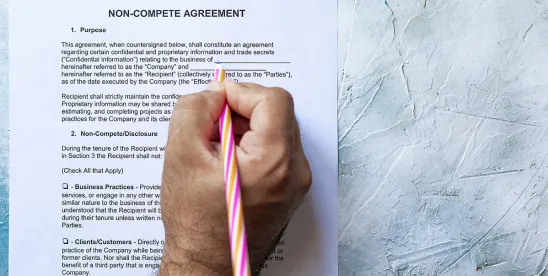In July 2021, President Biden signed an Executive Order directed at promoting competition in the U.S. economy. As part of that overarching goal, the Biden Administration tasked the Federal Trade Commission (“FTC”) with curtailing the use of non-compete clauses “and other clauses or agreements that may unfairly limit worker mobility.” While the FTC has only recently initiated informal proceedings on the issue, the agency – and perhaps Congress as well – seems poised to move forward in 2022 to address restrictive covenants.
Part of the delay on any action by the FTC can likely be attributed to vacancies at the commission. The FTC has been operating with four members (two Democratic Commissioners and two Republican Commissioners), with one vacancy, which leaves the FTC with a political tie effectively preventing it from making large-scale decisions. However, President Biden has now nominated Alvaro Bedoya to fill the remaining vacancy. His confirmation remains pending and will likely carry over into 2022.
Despite the gridlock, the FTC has nevertheless worked to lay the groundwork for initiating formal proceedings soon. Earlier this month, the agency (in coordination with the Department of Justice) held two days of workshops, informal fact-gathering, and panels – titled “Making Competition Work: Promoting Competition in Labor Markets” – on addressing “competition issues affecting labor markets and the welfare of workers.” The fact-gathering and presentations focused on post-employment obligations and restrictive covenants, including non-compete agreements. This informal fact-gathering event will likely serve as the foundation for teeing up formal proceedings in 2022 (assuming the FTC’s commission vacancy is filled).
But Congress has also decided to give restrictive covenants a second-look. Parallel to the FTC’s informal proceedings, Congress has pushed its Freedom To Compete Act (the “Act”) forward for committee review. The Act is a bi-partisan bill intended to narrow the use of non-compete agreements in employment contracts. It would void all “non-compete agreements” entered before the Act and prohibit them going forward. A non-compete agreement is broadly defined as any agreement between an employer and employee that, following termination, restricts an employee from working for any employer for a specified time, in a geographic area, or that is a possible competitor. See Act § 8. However, the Act would not apply to certain exempt employees, which includes outside salespersons and academic administrative personnel, among others. See 28 U.S.C. § 213(a)(1). The Act currently remains pending in committee.
Thus, we can likely expect federal action – either legislative or executive – on restrictive covenants in the near future. However, loosening post-employment restrictions raises serious concerns about preserving invaluable intellectual property, trade secrets, and other confidential information. Indeed, if an employee can change jobs at any time without any restrictions, then access to proprietary and confidential information obtained by that employee becomes even easier. With that in mind, employers should ensure all future post-employment agreements contain adequate protections related to intellectual property and confidentiality, as well as ensure existing agreements have the same protections in the event any federal action applies retroactively. These protections may include standard confidentiality provisions restricting the use and disclosure of proprietary information, as well as provisions expressly authorizing injunctive relief in the event of improper use or disclosure.



 />i
/>i

